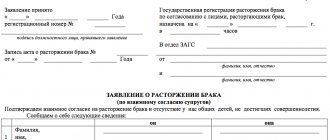New edition of Art. 21 IC RF
1. Divorce of a marriage is carried out in court if the spouses have common minor children, except for the cases provided for in paragraph 2 of Article 19 of this Code, or in the absence of the consent of one of the spouses to dissolve the marriage.
2. Divorce of marriage is also carried out in court in cases where one of the spouses, despite the lack of objections, evades divorce from the civil registry office, including refusing to submit an application.
Article 19. Divorce in the civil registry office
1. If there is mutual agreement to dissolve the marriage of spouses who do not have common minor children, the dissolution of the marriage is carried out in the civil registry office.
2. Divorce at the request of one of the spouses, regardless of whether the spouses have common minor children, is carried out at the civil registry office, if the other spouse:
declared missing by the court;
declared incompetent by the court;
convicted of committing a crime to imprisonment for a term of over three years.
3. Divorce and the issuance of a certificate of divorce are carried out by the civil registry office after a month has passed from the date of filing the application for divorce.
4. State registration of divorce is carried out by the civil registry office in the manner established for state registration of civil status acts.
How is property divided during a divorce if there are children?
Division of property is the procedure for allocating shares of each spouse in joint property. The joint property of a husband and wife is considered to be property acquired by the spouses during an official marriage (Article 34 of the RF IC), and we are talking not only about real estate and movable property expressed in material terms - income from activities, pensions and other social benefits are also considered joint property. payments, etc.
As a rule, when determining the shares of spouses , for example, in real estate, these shares are recognized as equal, unless a different provision is certified by a marital agreement (for example, in an agreement or prenuptial agreement).
When there are minor children in a family, the court has the right to ignore the principle of equity equality, based on the interests of the child and the parent living with him, taking into account circumstances worthy of attention.
If a family consists of three people (mother, father, child), the apartment is joint property, and the child remains to live with the mother after the divorce, the court will most likely determine a larger share for the mother, taking into account the continued residence of the minor with her. However, when dividing, the court takes into account other circumstances to make a fair decision:
- investments in the housing of each spouse (in purchase, in repairs, in payment of mortgage payments, etc.);
- financial situation of the parties;
- the presence or absence of other housing;
- health status, etc.
Art. 36 of the RF IC regulates the list of property that is not subject to division: according to the norms of this article, personal belongings acquired to meet the needs of minor children (shoes and clothing, toys, children's furniture, sports, musical equipment, etc.) will be left by the court with the spouse, with whom the child remains to live.
Article 21. Divorce in court
1. Divorce of a marriage is carried out in court if the spouses have common minor children, except for the cases provided for in paragraph 2 of Article 19 of this Code, or in the absence of the consent of one of the spouses to dissolve the marriage.
2. Divorce of marriage is also carried out in court in cases where one of the spouses, despite the lack of objections, evades divorce from the civil registry office, including refusing to submit an application.
Child's last name after divorce
By default, after the parents’ divorce, the child retains the last name that was originally assigned to him on the birth certificate: as a rule, this is the father’s last name.
However, family law does not prohibit changing surname (Article 59 of the RF IC), but this will require:
- mutual desire of both parents;
- permission from the guardianship and trusteeship authority;
- consent of a child over 10 years of age.
If one of the parents does not agree with changing the child’s surname, this cannot be done, except in situations where:
- it is impossible to establish the parent’s place of residence (for example, he is in the executive or criminal investigation department);
- the father or mother is incompetent or deprived of parental rights;
- perform their duties improperly (for example, have a child support debt).
When a child reaches 14 years of age, he has the right to independently demand a change of surname (Article 58 of Federal Law No. 143-FZ of November 15, 1997 “On Civil Status Acts”).
Article 23. Divorce of marriage in court with mutual consent of the spouses to dissolve the marriage
1. If there is mutual consent to dissolve the marriage of spouses who have common minor children, as well as the spouses specified in paragraph 2 of Article 21 of this Code, the court dissolves the marriage without clarifying the reasons for the divorce. Spouses have the right to submit to the court an agreement on children, provided for in paragraph 1 of Article 24 of this Code. In the absence of such an agreement or if the agreement violates the interests of children, the court takes measures to protect their interests in the manner prescribed by paragraph 2 of Article 24 of this Code.
2. Divorce of marriage is carried out by the court no earlier than the expiration of a month from the date the spouses filed an application for divorce.
How are children divided in a divorce?
An emotionally difficult issue in divorce is the division of children between parents. As is known, in most cases, children remain with their mother; no more than 5% of court decisions are made to award the child permanent residence to the fathers.
The court considering the issue of determining the place of residence of a minor may be:
- district - if the parents were unable to resolve the issue peacefully and did not reach an agreement on who the child would stay with;
- settlement - if the dispute is settled by the parents in an agreement in accordance with Art. 24 IC RF.
If the place of residence is determined simultaneously with the divorce in a district court , the guardianship and trusteeship authorities will be involved in mandatory participation as a third party, which will give an independent document-conclusion regarding the substance of this dispute.
In addition to the opinion of the guardianship and trusteeship authority, the court will also take into account the desire of a child who has reached the age of 10 to remain with one of the parents, if it does not contradict his interests.
When determining a child’s place of residence, the court must take into account the following aspects:
- Age of the child (courts mostly leave young children with their mother).
- Gender of the child (teenage girls, due to the characteristics of pubertal development, are more likely to live with their mother, and boys, on the contrary, with their father).
- Place of residence (if the mother, after the divorce, lives in a block next to the school where the child is studying, the clinic where he is registered, and the father lives in another district or in another city, most likely the court will leave the child with the mother so that the parents’ divorce does not coincided with his move, change of school, etc.).
- Living conditions - the guardianship and trusteeship authority, in the process of preparing the case for trial, receives from the court an order to conduct an examination of the living conditions of both parents , and submits to the court inspection reports reflecting this. In this case, the court’s attention is paid to whether the child has a separate room, an individual sleeping and working place, cleanliness and order in the house, etc.
- The state of health of both the child himself and each of the parents.
- Parents' salary and other social characteristics:
- absence/presence of a criminal record;
- characteristics from neighbors;
- place of work and education;
- presence of disability, etc.
If there are two or more children, from a moral point of view it is not customary to separate blood brothers and sisters into different families, but if the conditions of the second parent are good and the child himself expresses a desire to live with him separately from other children, the court can separate the children by determining whether they will live with someone else. sometimes with the father, and someone with the mother.
Agreement on children in case of divorce
To prevent the fate of children from being decided by third parties, which are the court and the guardianship and trusteeship authorities, the best way to regulate the residence of children is to draw up an agreement and submit it to the court (Article 24 of the RF IC).
The main condition of the agreement is respect for the rights and legitimate interests of the child and his parents. If the court is presented with a document that clearly infringes on the rights of at least one of the parties, the court has the right not to take it into account and resolve controversial issues independently.
A statement of claim for divorce in the presence of an agreement on children drawn up between the parents is subject to consideration by a magistrate's court .
The agreement may be submitted to the court:
- in advance in writing (with other documents attached to the claim);
- in an oral petition directly at the court hearing for the inclusion of such a document in the case.
Notarization of the agreement is not a mandatory condition only if it does not resolve the issue of alimony maintenance for the common “child”. If the document raises the issue of alimony, its certification by a notary is mandatory in accordance with Art. 100 of the RF IC, which gives the agreement the force of a writ of execution.
An agreement on the upbringing and maintenance of joint minor children will undoubtedly please any judge, who has relieved himself of the burden of resolving pressing issues, will reduce the time of the divorce process and approach the divorce on the terms of a “painless” compromise between the “spouses-parents”.
Article 24. Issues resolved by the court when making a decision on divorce
1. In the event of a judicial dissolution of a marriage, the spouses may submit for consideration by the court an agreement on which of them will live with minor children, on the procedure for paying funds for the maintenance of children and (or) a disabled needy spouse, on the amount of these funds or on the division of common property. spouses' property.
2. If there is no agreement between the spouses on the issues specified in paragraph 1 of this article, as well as if it is established that this agreement violates the interests of the children or one of the spouses, the court is obliged to:
determine which parent the minor children will live with after the divorce;
determine from which parent and in what amount alimony for their children is collected;
at the request of the spouses (one of them), to divide the property in their joint ownership;
at the request of the spouse entitled to receive maintenance from the other spouse, determine the amount of this maintenance.
3. If the division of property affects the interests of third parties, the court has the right to separate the requirement for division of property into separate proceedings.
Child's opinion when parents divorce
Family law provides the child with the strict right to express his own opinion when resolving issues affecting his rights and interests.
- Answer a few simple questions and get a selection of site materials for your case ↙
the age of 10 at the time of his parents’ divorce has the right to express his opinion to the court about the main aspects of his further residence and upbringing, if this does not contradict his interests (Article 57 of the RF IC).
The judge is obliged to hear the minor’s arguments and take them into account, unless they directly contradict his health and upbringing.
Article 25. Moment of termination of marriage upon its dissolution
1. A marriage dissolved by the civil registry office shall be terminated from the date of state registration of the dissolution of the marriage in the civil registration book, and in the case of a divorce in court - from the day the court decision enters into legal force.
2. Divorce in court is subject to state registration in the manner established for state registration of civil status acts.
The court is obliged, within three days from the date of entry into legal force of the court decision on divorce, to send an extract from this court decision to the civil registry office at the place of state registration of the marriage.
Spouses do not have the right to enter into a new marriage until they receive a certificate of divorce from the civil registry office at the place of residence of any of them or at the place of state registration of the marriage.
Determining the residence of children after divorce: Family Code
The procedure for establishing the address of residence of children after the dissolution of the marriage of the parents is regulated by Art. 65. Family Code.
The legislation provides the opportunity for spouses to independently come to a peaceful agreement on the place of residence of their child. The agreement is drawn up in writing and signed by both parties; a photocopy of the receipt must be attached to the divorce claim.
However, the agreement will not be taken into account by the court if it contradicts the interests of the minor. If there is no compromise between the parents, the child’s place of residence is determined by the judicial authority.
The judge's verdict is influenced by such circumstances as:
- model of the minor’s relationship with each parent;
- emotional predisposition to mom and dad, other family members;
- material security of each spouse;
- living conditions of the parents and the possibility of providing the child with his own sleeping place and desk;
- characteristics of spouses from the moral, ethical and psychological aspects;
- type of activity of mother and father, work schedule density;
- the child’s ability to adapt to new conditions and establish contact with other people;
- proximity to a kindergarten or school, depending on the age of the child.
It is mandatory to involve the guardianship and trusteeship authorities to assess living conditions; the judge can also hear testimony from teachers or educators, a pediatrician, neighbors, employers and other acquaintances of the spouses who can characterize them as parents.
Can the child stay with his father?
Statistics on child residence disputes show that 52% of claims seeking domicile determination are filed by men. The court satisfied the fathers' demands in 59% of cases.
In cases where the initiator of the debate was a woman, the minor remained with the mother in 77%. From statistical data it is clear that the court is more favorable to plaintiffs than to defendants.
The judge's verdict is also influenced by the evidence collected by the father. A man should carefully prepare documents confirming that the father has better living conditions, education and development of the child than the mother: income certificate, job description, photographs, receipts, checks and other evidence.
The court is likely to rule in favor of the father if the mother:
- is registered in a drug treatment clinic;
- incapacitated;
- leads an immoral, immoral lifestyle;
- resorts to physical and psychological violence;
- has no home;
- cannot provide enough attention to her baby.
Children's rights after divorce
Children, like adults, are citizens of the country and fall under the legal protection of the state from the moment of birth.
The breakdown of the relationship between father and mother does not abolish the rights of their child.
However, due to conflicting relations between spouses, disputes may arise related to the child’s residence, his communication with the separated parent, and the property rights of the minor.
For housing
The legislation provides for the mandatory registration of a minor at the place of registration of his parents within a month from the date of birth.
It is possible to be discharged from the living space only in cases where the minor is registered at a different address or reaches 18 years of age.
The right of a child to live with his parents guarantees the possibility of his registration at the place of registration of one of the parents without the consent of the owner of the property until the minor turns 14 years old.
For communication
An exceptional case may be communication that is contrary to interests and poses a threat to his physical and psychological health.
The form of communication is not limited by law and can be written, oral, face-to-face or correspondence.
If a parent or other relative lives in another city or country, he/she still has the right to communicate. It is not against the law for a child to travel abroad for temporary residence with another parent.










